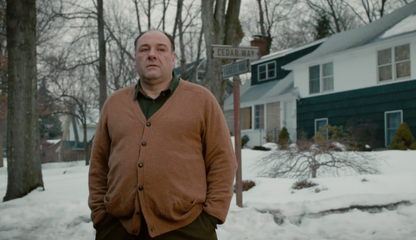David Chase, and probably most writers, writes what he knows. There are some autobiographical components to The Sopranos, in the family and manipulative mother department, and less in the numbers running and general Mafia activity. Where David Chase made his opus semi-autobiographically, his follow-up film Not Fade Away feels even more personal. Writer/director and protagonist share difficult parents, a love of music, and the same basic coming of age in the early tumult of the post-Camelot sixties. It also trades the Sopranos' foundational pessimism for something approaching optimism, an unavoidable byproduct of creating a film about teenagers set in this time period.

Not Fade Away attempts to grasp as much of this time period as it can, sometimes to its detriment. It wants to cover music and the thrill of performance and the possibility of breaking through, while also examining Douglas and Pat's relationship in depth, Douglas and Grace's relationship, and the counter-culture as well. A tighter focus would've relegated the latter aspect to the background, and it's so central to the music and the fashion the music pushed onto millions of teenagers, that the viewer would've gotten the gist. Instead, Chase spends a fair amount of time with Grace's family, and her hippie sister's clash with their ultra-conservative father. The whole affair doesn't especially color Grace's character, and the yawning chasm between generations is equally communicated in Douglas's decaying relationship with his father. The film feels both too long and too short at the same time, as Grace's subplot might've been lengthened to give it more depth, or just cut altogether.
Chase is most successful at depicting a father and son. Gandolfini is phenomenal as Pat, a frustrating and frustrated man anchored to a woman incapable of joy. His pre-college scenes with Douglas have the aura of Italian-American Rockwell, as they both watch the Twilight Zone while eating ice cream. The son tries to explain it to the dad, the dad doesn't fully get it but humors his kid, the son talks about joining the army, the dad responds back with cliched advice that the son readily absorbs. In a lesser actor's hands, it would come off as condescending, but Gandolfini is loving that moment, and Magaro is giving it back. Once Douglas gets back from college, all that is gone, the rebellious son now anxious to leap at every opportunity to remove a brick from his father's worldview, not out of a desire to enlighten but a desire to hurt. Holiday dinners are ruined, breakfasts turn hostile. Chase walks some of this back as the film continues and some reconciliation is allowed, but the wounds are still too fresh for real honesty and vulnerability. As cinematic father-son relationships go, this is a strong one, so specific in some of its nuances that it must be taken partly from Chase's life.
While Chase succeeds the strongest in the aforementioned area, he seems most interested in the experience of forming a band, which Chase did when he was Douglas's age, possibly also to get girls. The film opens with pre-Rolling Stones Keith Richards and Mick Jagger meeting on a train, discussing their interests in music and the kind of instruments they practice on. If these two guys could do it, why not Douglas and his friends? It's hardly a spoiler to say that The Twylight Zones don't break out, due to a mix of inter-band politics, bad luck, and an unwillingness to fully commit. They are talented enough, and Chase does a great job with the musical scenes, filming them in as sensual a way as possible. However, the band's progress is muddled, as large stretches of time pass between performing. It's not the least interesting facet of the film, but it's another too-small piece in a film with big ambitions.
Perceived flaws continue in some of the film's characterization. For half the film, Magaro is fully inhabiting the prototypical know-it-all teenager who comes home from two months of college and now knows everything about the world. He plays it well, and the character is often right in what he's saying, but is so insufferable as to turn the audience against him. Chase also recycles wholesale from the Sopranos, especially the mother character who is a cut-and-paste job on Livia Soprano. Price is fine, but she'll never surpass Nancy Marchand. These issues, plus the noble problem of biting off more than it can swallow, make Not Fade Away somewhat disappointing as it comes from the creator of one of my favorite TV shows and the ostensible father of the current Golden Age of Television. An inventive, enthralling ending, something Chase is known for, can't quite erase my misgivings. C+
 RSS Feed
RSS Feed